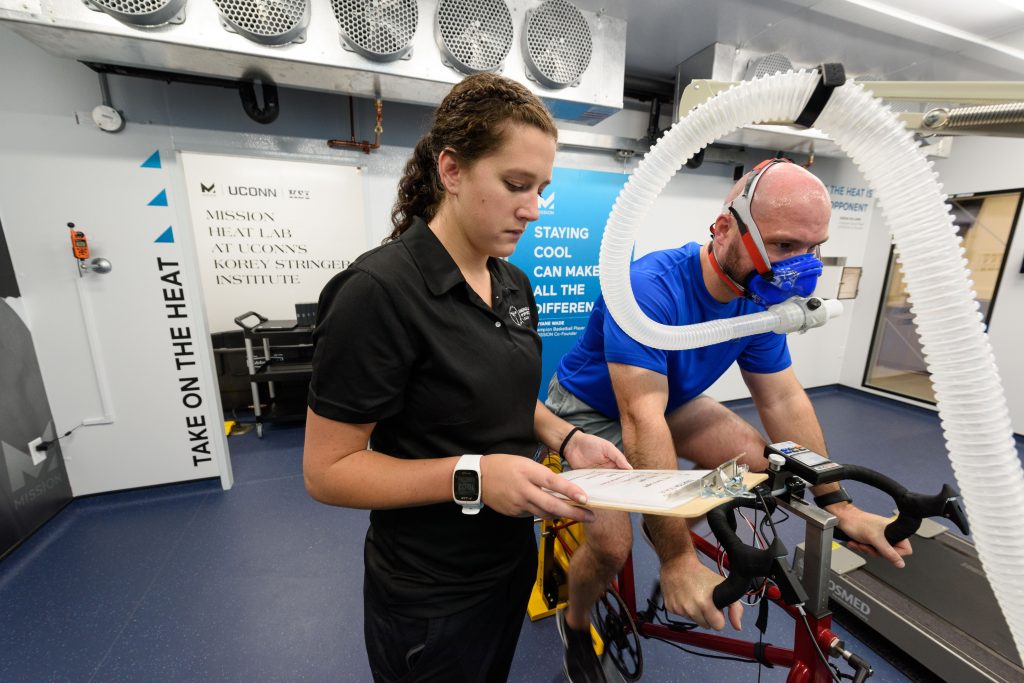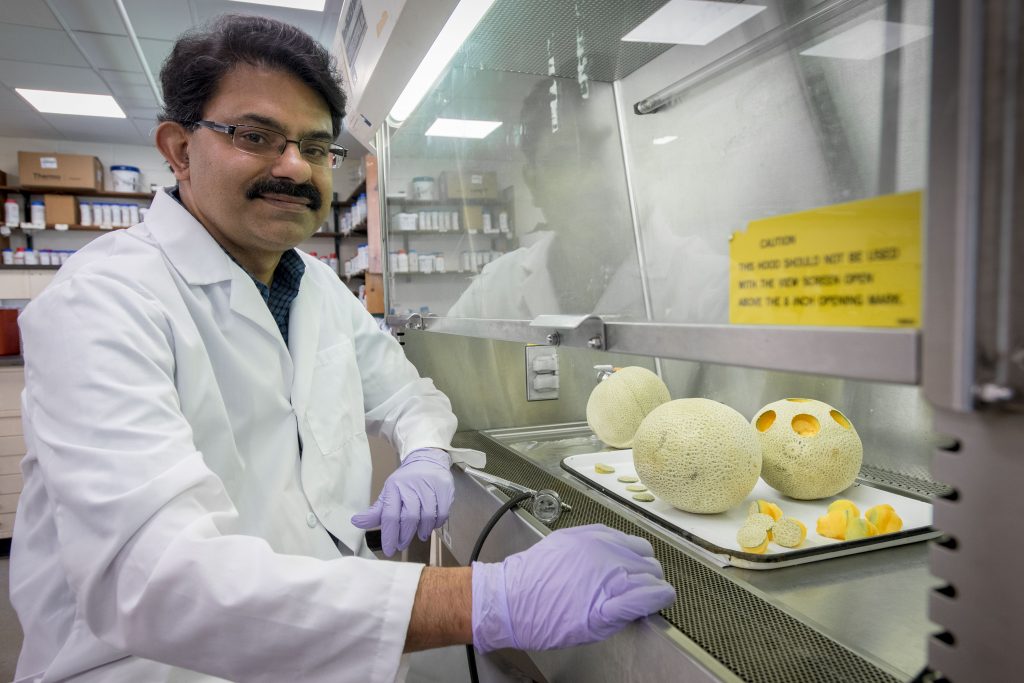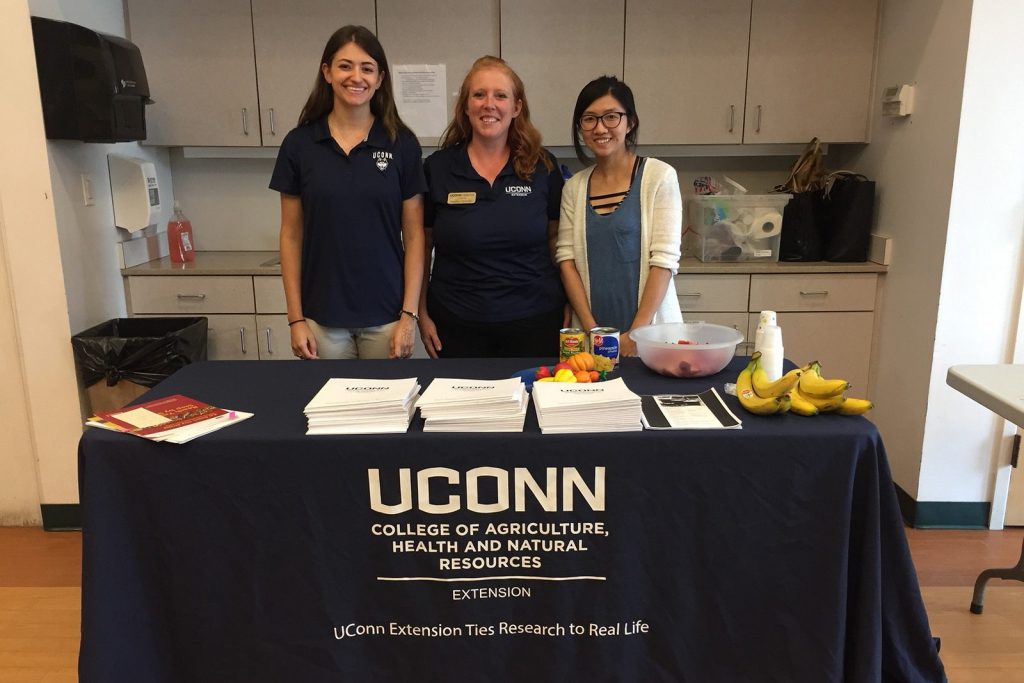To commemorate the 10th anniversary of "Health" being added to its name, CAHNR is kicking off a year-long celebration of health-related research, education, and extension outreach taking place across the College.

Chelsea Garcia, a graduate student studying in the Department of Nutritional Sciences in the College of Agriculture, Health and Natural Resources, demonstrates lab techniques to fellow graduate students Oliver Otoko and Lidan Gao in the Blesso Lab in the Advanced Technology Laboratory (ATL). Oct. 6, 2023. (Jason Sheldon/UConn Photo)
In 2014, something monumental happened at the University of Connecticut's College of Agriculture, Health and Natural Resources (CAHNR). The College changed its name. Again.
To commemorate the 10th anniversary of "Health" being added to its name, CAHNR is kicking off a year-long celebration of health-related research, education, and extension outreach taking place across the College.

"Since we are the foundation of the original Storrs Agricultural College established in 1881, it makes sense that we would have been called many things over the years," says Indrajeet Chaubey, the 13th Dean of the College. "Our current name reflects the breadth and diversity of research, academic offerings, and extension engagement taking place in CAHNR. Health is a huge part of that work, and I'm excited to showcase our faculty, students, staff, and alumni successes throughout the year."
History of Health
While "Health" may have only been added to the College's name a decade ago, it has been a part of its mission and offerings for much longer.




Going way, way back, the College has long focused on the connection between animal diseases and humans. The Department of Pathobiology and Veterinary Science, previously called the Department of Animal Diseases, first originated in 1923 as a small group of pathologists, veterinarians, and microbiologists. While the department's original mission was to preserve livestock, ensuring public health has become a greater focus. The home of the Connecticut Veterinary Medical Diagnostic Laboratory (CVMDL), the department works with state and federal agencies, local vets, and the public to help monitor the spread of disease between humans and animals. Faculty have received almost $19 million in research funding over the last five years to support this work. From identifying invasive tick species to shedding light on walking pneumonia for vaccine development, the department's unique expertise at the intersection of human and animal health has long strengthened CAHNR's ability to improve quality of life for residents of the state.
The Department of Nutritional Sciences has a distinguished record of teaching, research, and community engagement as well. Established in 1970 as one of CAHNR's first departments entirely dedicated to human health, Nutritional Sciences marked its 50th anniversary with virtual celebrations in the fall of 2020. Ranked the 9th best program in the country for undergraduate studies in nutritional sciences, the department has won an impressive $8 million in research funding over the last five years. Notable work includes comprehensive studies on the health benefits of eggs, the use of nanotechnology for a healthier, shelf-stable saturated fat alternative, and recommendations for weight loss interventions to address obesity disparities in Black communities.
In 2006, the Department of Allied Health Sciences was formed and joined CAHNR. Previously the School of Allied Health, the department has experienced significant growth in all areas of UConn's tripartite mission over the last 17 years. Serving only around 130 undergraduate and graduate students in the early 2000s, the allied health sciences program is now home to approximately 800 Huskies. Focusing primarily on professional training, the Department of Allied Health Sciences expanded their offerings to include a full four-year degree option at UConn Waterbury in the fall of 2020. The department is full of heavy-hitters in the field of research as well, having won over $28 million in funding in the last five years. Notable work includes improving intervention outcomes for people who use drugs and are at high risk for HIV infection, studies on the impact of environment on cardiometabolic diseases, and a review of abortion disinformation on social media after the overturning of Roe v. Wade.
The most recent department to be added, the Department of Kinesiology joined CAHNR in 2014 to more closely align its research, teaching, and community engagement mission with its administrative home. Since the move, the department has continued to thrive, with almost $17 million in research funding in the last five years. Kinesiology faculty study a wide variety of health-related topics - from shedding light on runner's knee to studying Parkinson's disease in Hispanic communities. Home to the 2nd ranked doctoral program in the country, the department continues to have an impact for students and patients around the world.
Holistic Approach
It comes as no surprise that ensuring a healthy population goes beyond nutrition, exercise, and regular medical care. Environmental considerations, a healthy and safe food supply, and plant health all come into play as well. Through a concept known as One Health, CAHNR is connecting these elements through research, academic offerings, and extension outreach.
What is One Health? Defined by the CDC as "an approach that recognizes that the health of people is closely connected to the health of animals and our shared environment," the One Health concept has taken center stage in recent years. As human populations grow, communities find themselves living in closer proximity to wild animals and livestock. Towns and cities are further encroaching on ecosystems, while the climate crisis disrupts the status quo. The Covid pandemic also underlined the need for One Health awareness, given the continued and increasing transmission of emerging diseases from animals to humans.
Leading UConn's charge in One Health expertise, CAHNR is training the next generation of scientists, extension educators, as well as the public. The College recently hired faculty within the Department of Pathobiology and Veterinary Science with a focus on One Health, and currently offers an undergraduate course within the department focused on the concept. A One Health minor is currently in progress, with an interdisciplinary focus to teach students how to approach the concept holistically. CAHNR is also hosting a One Health conference on April 1, 2024 at the UConn Student Union.
While One Health becomes more and more critical in modern society, CAHNR has long worked to improve quality of life for Connecticut residents in both obvious and surprising ways.
"As the foundation of UConn's land-grant status, we take our responsibility to our state very seriously," says Chaubey. "Tackling the greatest challenges that people in Connecticut face, and providing solutions they can implement now is in our DNA."
Many of CAHNR's projects and programs have a strong, direct focus on people. The UConn Center for mHealth and Social Media is focused on research using mobile technology and social media for health promotion and disease prevention. Part of UConn InCHIP and led by professor of allied health sciences, Sherry Pagoto, the center has studied mental health apps, the role of tanning beds on cancer and other health behaviors, and the use of social media platforms for weight loss management.
The Korey Stringer Institute (KSI) works to keep people safe from a variety of potential health conditions. KSI was founded in collaboration with the NFL in memory of Minnesota Vikings player, Korey Stringer, who died tragically in 2001 from exertional heat stroke. Established in 2010, KSI provides research, education, advocacy, and consultation to maximize performance and safety for anyone who participates in taxing physical activities, like athletes, laborers, and warfighters.

Healthy Family CT, an educational program offered through UConn Extension and the Department of Allied Health Sciences, aims to provide nutrition resources for families who receive SNAP benefits. With tons of fact-based resources available in English and Spanish, Healthy Family CT connects UConn with communities across Connecticut.
Research within the Department of Agricultural and Resource Economics also has obvious implications for human health, even though faculty work with data rather than patients or participants. Tatiana Andreyeva recently received $1 million in grant funding from the Connecticut Department of Public Health to study how infant feeding practices such as breastfeeding changed throughout the pandemic and how these changes affected children's health and weight outcomes.
The connection between other examples of CAHNR research and health may be less visible, but these programs still pack a major punch.
For instance, the connection between urban forestry and human health may not be apparent, but it's critically important for communities including many in Connecticut. Faculty from the Department of Natural Resources and the Environment and UConn Extension are connecting the dots between urban ecosystems and forests with the communities that live near them. From the socio-economic impacts of forests to climate-induced urban heat islands, and equitable access to fresh water and clean air: health is inseparable from our natural world.
Researchers in the Department of Plant Science and Landscape Architecture work to ensure the health of our ecosystems, food supply, and populations as well. Yi Li, professor of plant science is studying gene editing techniques in tomato plants. Genetically engineered organisms are becoming increasingly popular given their potential applications to improve food supply. Li is exploring lesser-known aspects of this promising approach, which could improve crops on a large scale.
And while the Department of Animal Sciences is obviously keeping a close eye on the health of UConn's cows, horses, chickens, and sheep, faculty like Dennis D'Amico also work to improve the safety of the human food supply. D'Amico, associate professor of dairy foods, studies how protective cultures can reduce food-borne pathogens like Salmonella and Listeria, two common pathogens, in the cheese we eat. Kumar Venkitanarayanan, a leading global expert in food safety and CAHNR's associate dean for research, has conducted research on a variety of foods - from cantaloupes to poultry - to ensure healthy, safe-to-eat foods make it onto our tables.





Improving Quality of Life for a Sustainable - and Healthy - Future
The importance of health-related research, teaching, and extension outreach is only getting stronger at CAHNR. In 2019 using 10,000 data points, the College developed its Strategic Vision to ensure its contribution to UConn's mission and to strengthen its value to the residents of our state. Ensuring health and well-being locally, national, and globally was one of the five priorities identified. The goal is multi-faceted and relies on diverse expertise in all of CAHNR's departments.
"We know that we have a unique role to play in this area and we're committed to really moving the needle," says Chaubey. "Celebrating the 10th anniversary of 'Health' being added to our College name gives us the chance to generate more discussions and connections and to continue to support a healthy Connecticut, from our people to native plants, animals, foods, and landscapes."






